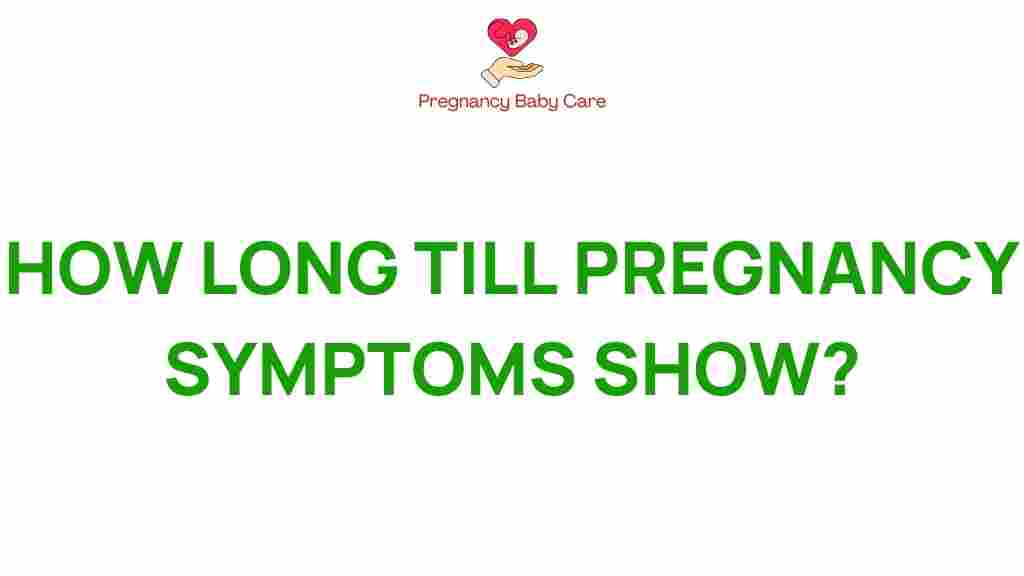Unraveling the Mystery: How Soon Do Pregnancy Symptoms Appear?
Understanding pregnancy symptoms is crucial for women who are trying to conceive or suspect they may be pregnant. Recognizing these early signs can help in managing health and wellness during the initial stages of pregnancy. In this article, we will explore when pregnancy symptoms typically appear after conception, what these symptoms are, and how hormonal changes play a vital role in this process.
The Pregnancy Timeline: When to Expect Symptoms
Pregnancy symptoms often begin shortly after conception, but the timing can vary from woman to woman. On average, most women start to notice signs of pregnancy within:
- 1 to 2 weeks after conception (around the time of a missed period)
- 4 to 6 weeks into pregnancy
- By the end of the first trimester
It’s important to note that individual experiences may differ based on various factors including hormonal changes, overall health, and fertility. Early signs of pregnancy can be subtle or pronounced, depending on the woman.
Common Early Signs of Pregnancy
Here are some of the common early signs of pregnancy that women may experience:
- Missed Period: One of the first and most obvious signs that pregnancy may have occurred.
- Morning Sickness: Nausea is common and can occur at any time of the day.
- Breast Changes: Tenderness, swelling, or changes in the areolas can occur due to hormonal changes.
- Fatigue: Increased fatigue is often a result of rising progesterone levels.
- Frequent Urination: This can start as early as two weeks after conception.
- Food Cravings or Aversions: Changes in taste preferences are common during early pregnancy.
- Mood Swings: Hormonal fluctuations can lead to emotional changes.
Hormonal Changes and Their Impact on Pregnancy Symptoms
Hormonal changes are at the heart of pregnancy symptoms. After conception, several hormones increase in the body, leading to various physical and emotional changes. Key hormones include:
- Human Chorionic Gonadotropin (hCG): This hormone is produced shortly after conception and is the basis for most pregnancy tests. It can cause symptoms like nausea and fatigue.
- Progesterone: Levels rise significantly during pregnancy and help maintain the uterine lining while also causing fatigue and breast tenderness.
- Estrogen: This hormone increases blood flow and can cause mood swings and other physical changes.
These hormonal shifts are essential for maintaining a healthy pregnancy and preparing the body for the development of the fetus.
Step-by-Step Process: How to Identify Pregnancy Symptoms
Identifying pregnancy symptoms involves a few steps:
- Track Your Cycle: Keep a record of your menstrual cycle to help identify any missed periods.
- Look for Early Signs: Pay attention to any unusual changes in your body, such as nausea, breast tenderness, or fatigue.
- Take a Pregnancy Test: If you miss your period and experience early signs, take a home pregnancy test for confirmation.
- Consult a Healthcare Provider: For a conclusive test and to discuss your symptoms, visit a healthcare professional.
Troubleshooting Common Concerns
Many women have questions or concerns when they suspect they might be pregnant. Here are some common troubleshooting tips:
- Negative Test Results: If you suspect pregnancy but get a negative result, wait a few days and test again. Hormone levels may not be high enough for detection yet.
- Unusual Symptoms: If you experience severe pain or unusual bleeding, contact a healthcare provider immediately.
- Emotional Changes: Mood swings are normal, but if they become overwhelming, consider speaking with a counselor or therapist.
Maintaining Health and Wellness During Early Pregnancy
Once you confirm pregnancy through symptoms and tests, maintaining health and wellness becomes a priority. Here are some tips:
- Nutrition: Focus on a balanced diet rich in vitamins, minerals, and folic acid to support fetal development.
- Hydration: Stay hydrated, especially if experiencing morning sickness.
- Exercise: Gentle exercise can help manage stress and improve overall well-being.
- Regular Check-ups: Schedule regular visits with your healthcare provider to monitor your health and the development of the pregnancy.
For more information on women’s wellness, you can visit WomensHealth.gov.
Conclusion: Understanding Your Body
Understanding pregnancy symptoms and the timeline in which they appear is crucial for any woman looking to conceive or confirming a pregnancy. Early signs can vary, but hormonal changes are the driving force behind these symptoms. Remember to listen to your body, track any changes, and consult with healthcare professionals for guidance. Keeping informed about your health and wellness during this exciting time is essential for both you and your future child.
If you are on a journey of conception, consider exploring resources on fertility and hormonal health, and stay connected with communities that support women’s health. For further insights and support, feel free to check out our additional articles on women’s wellness.
This article is in the category Pregnancy and created by PregnancyBabyCare Team
